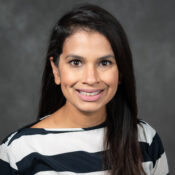
Speaker
Wajiha Akhtar
Assistant Director, UW Population Health Institute, UW–Madison
Dr. Wajiha Akhtar is the assistant director of the University of Wisconsin Population Health Institute. She specializes in utilizing epidemiological methods to assess policies associated with community-level outcomes, assessing large secondary datasets for evaluation, and engaging with targeted stakeholders for the purpose of decreasing health inequities within our society. Dr. Akhtar received her bachelor of science degree in biomedical engineering from the University of Miami, and her master’s in public health and doctorate in epidemiology from the University of Florida. She serves on the Board of Directors for One City Schools in Madison, Wisconsin, and HEART, a national non-profit promoting sexual health and sexual violence literacy in Muslim communities. Dr. Akhtar is part of the Muslim and Muslim-Allied Faculty and Staff group at UW-Madison. She combines her work in health equity and her personal experience with Islamophobia to inform the work being done at UW–Madison.
Speaking in
The Islamophobia Sniff Test: Recognizing Islamophobia On College Campuses and the Impact It Has On Our Community
Islamophobia and anti-Arab racism are deeply rooted prejudices that target Muslims and individuals perceived as Muslim, such as Arab Christians and non-Muslim South Asians. They fuel hate speech, hostility, hate crimes, and intolerance, often manifesting as discrimination, harassment, abuse, and intimidation. In the United States, Islamophobia and anti-Muslim racism have been used to justify concerning policies, including mass surveillance, guilt by association, and collective punishment of members of the Muslim community. And on campuses, inequitable policies have also led to harassment and bigotry that allows for unsafe conditions for Muslim and Arab students. During this session, UW Muslim and Muslim-Allied Faculty and Staff will share research on the origins of Islamophobia in the US, societal repercussions that has led to inequities for Muslim and Arabs, research on how it has manifested at UW-Madison, and ways the campus community can foster inclusion and belonging so everyone can thrive.
Session Objectives
- Explain the origins of Islamophobia in the US, originating from anti-Palestinian bigotry, evolving as anti-Arab racism, and later as widespread Islamophobia.
- Describe case examples of how collective punishment has allowed for justification of dehumanization and deprivation of rights typically afforded to other individuals.
- Evaluate results from the 2021 Campus Climate Survey, a fall 2023 listening session with Muslim and Arab students, and 2023 Color of Drinking study, in order to name how Muslims and Arabs at UW-Madison feel.
- Identify factors that influence inclusion and belonging for Muslim and Arab Americans at UW Madison.